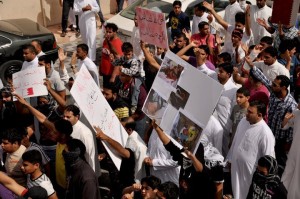Iran warned Saudi Arabia on Monday of the dire consequences of Riyadh’s intervention in Bahrain.
Supreme Leader Ayatollah Ali Khamenei’s adviser for military affairs, Maj. Gen. Yahya Rahim Safavi, told journalists, “The presence and attitude of Saudi Arabia (in Bahrain) sets an incorrect precedence for similar future events, and Saudi Arabia should consider this fact that one day the very same event may recur in Saudi Arabia itself and Saudi Arabia may come under invasion for the very same excuse.”
A post-U.S. Iraq renders the Saudi kingdom vulnerable to a future Iranian invasion.
The remarks made by Safavi, who formerly served as commander of Iran’s elite military force, the Islamic Revolutionary Guards Corps (1997-2007), constitute the first time Tehran has issued such a direct warning. The Saudis and the Iranians have had tense relations since the founding of the Islamic republic in 1979 and increasingly so since the U.S. invasion of Iraq toppled the Baathist regime, which led to a Shiite-dominated Iraqi state and the empowering of Iran. But never before has Iran issued a public statement about an invasion of the Saudi kingdom.
So, why is the Persian Shiite state engaging in such threats now? The Saudi move to intervene in neighboring Bahrain, where popular unrest was largely waged by the Shiite majority, threatened to topple a Sunni monarchy. Well aware of the implications, the Saudis embarked on their first long-term, overseas military deployment, sending in 1,500 troops to help Bahraini forces crush the Shiite opposition.
The Saudi move succeeded in quelling the unrest (for now at least), which placed Iran in a difficult position. Lacking the capability to physically aid their fellow Shia in the Persian Gulf, the Iranians were caught in an awkward situation. Iran had to do more than issue diplomatic statements and engineer protests against the Saudis and their allies.
Warning the Saudis that they too could be invaded on the same pretext that they used to go into Bahrain is definitely an escalation on the part of the Iranians. Since Iran making good on its threat is unlikely to happen anytime soon (given that the United States would not stand by and allow Iran to attack Saudi Arabia), this can be argued as yet another hollow threat. A more nuanced examination of the situation, however, suggests that Tehran is not just simply engaging in bellicose rhetoric.
Instead, Iran is trying to exploit Saudi fears. The Wahhabi kingdom fears instability (especially now when it is in the middle of a power transition at home and the region has been engulfed by popular turmoil). The clerical regime in Iran sees regional instability as a tool to advance its position in the Persian Gulf region.
Riyadh can never be certain that Tehran won’t ever attack but Iran would have to overcome many logistical difficulties to make good on its threat. The Saudis are also not exactly comfortable with the idea of overt military alignment with the United States. The last time the Saudis entered into such a relationship with the Americans was during the 1991 Gulf War and it lead to the rise of al Qaeda.
Put differently, any conflict involving Iran entails far more risks than rewards for the Saudis. Cognizant of the Saudi perceptions, the Iranian statement is designed as a signal to the Saudis that they should accept Iran as a player in the region or be prepared to deal with a very messy situation. The key problem for Saudi Arabia is that Tehran doesn’t have to actually resort to war to achieve its ends. But Riyadh’s efforts to counter Iran and its Arab Shiite allies are likely to create more problems for the Saudis because crackdowns are contributing to long-term instability in the region and causing agitation among the Shia, which Iran can use to its advantage.



































